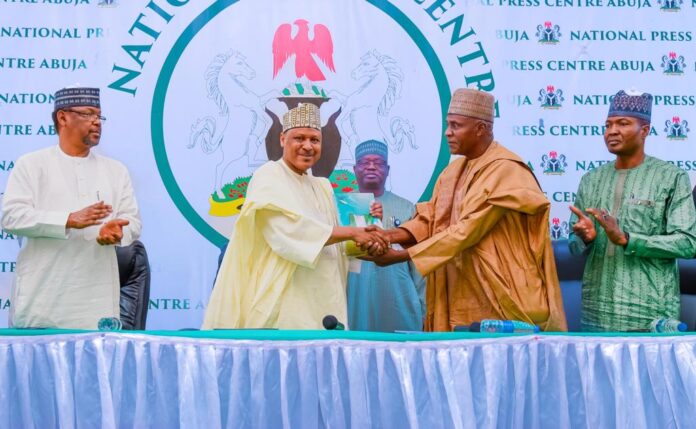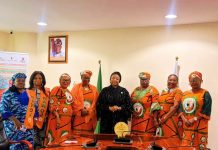
Minister of Information and National Orientation, Mohamed Idris, has received the blueprint of the National Values Charter with a pledge to implement a comprehensive strategy that considers the various ways moral values can become engrained in the hearts and minds of every citizen.
In December 2023, the Minister constituted a 10-man Committee to finalise Nigeria’s Values Charter, which will be unveiled by President Bola Tinubu this year.
In his remarks, while receiving the blueprint from the Chairman of the Committee, Dr. Mohammed Auwal Haruna, in Abuja on Tuesday, Idris said the Tinubu Administration is determined to define and document the core values that will guide all Nigerians, irrespective of tribe, religion, social and economic status, and all other real or imagined barriers and differences.
“The premise of the National Values Charter is that the government, as represented by elected and appointed representatives, must fulfil basic non-negotiable promises; in return for fundamental commitments from the citizens.
“After all, governance is a social contract; life is about give and take. As the famous saying goes, ‘to whom much is given, much is expected’. Every right comes with a burden of responsibility or set of responsibilities, just as every responsibility should guarantee the enjoyment of certain immutable rights,” he stated.
The Minister said the Charter contains Seven Core Promises of the Nigerian state to the citizens, followed by the Seven Commitments of the citizens towards their country.
He said the current National Values Charter also takes into account the fact that Nigeria has a bourgeoning youth population who lives in a technology-driven world, as such, the government is determined to ensure that the young people of Nigeria own the social contract, and are allowed to take the lead in using it to build, in concert with older generations, a better country, and a better world.
“What we are doing now is building on what has come before. Most importantly, we are serious about learning from the shortcomings of past approaches, and ensuring that we do stand the test of time,” he said.
The Minister acknowledged the efforts of successive governments in trying to find solutions to the systemic erosion of moral values among Nigerians through programmes such as “Nigeria: Good People, Great Nation”, “Change Begins with Me”, the publication in 2020 of a National Ethics and Integrity Policy, among others, stressing that those efforts were geared towards building a nation with positive values that will enable Nigeria to be counted among the best in the world.
Idris said the absence of values, and of a consensus around what celebrated national values should be, has led to the elevation of immorality into a national lifestyle.
The Minister said the government is not unaware that many Nigerians have become skeptical and disenchanted with things in the country especially security challenges, unemployment, corruption, failed promises, lack of social amenities, illiteracy, and many others, which were at the core of fueling the emigration of Nigeria’s greatest assets in search of greener pastures across the world.
“Let it be clear that we are not trying to deflect any blame or responsibility due to the Government or the ruling class. No. With this National Values Charter, we are only seeking to map out the various rights, roles, and responsibilities of all Nigerians—leaders and followers, public and private sectors—on this quest for national greatness. Everyone has a part to play; and I must say that the Government, made up of elected and appointed officials, will always have a significant burden of leadership responsibility upon it,” he said.
The Minister expressed the hope that Nigerians, at all levels, will embrace the Values Charter as a springboard, in line with the Renewed Hope Agenda of President Tinubu, to build a united, peaceful, and prosperous Nigeria, that will take her rightful place in the comity of nations.
In his remarks, the Chairman of the Committee, Dr. Haruna, who commended the Minister for deploying professionalism in changing the narratives of the Federal Ministry of Information and National Orientation, said they approached their work with a sense of urgency in the realization of the fact that no sustainable development could be achieved amid moral turpitude.
Rabiu Ibrahim
Special Assistant to the Hon. Minister of
Information and National Orientation
23rd January, 2024





